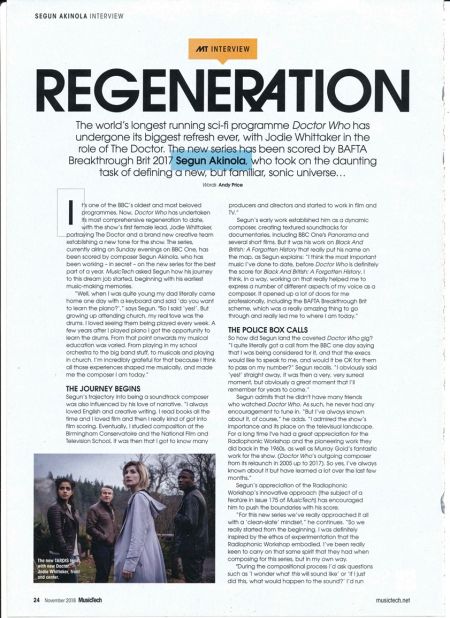Regeneration (MusicTech)
The world's longest running sci-fi programme Doctor Who has undergone its biggest refresh ever, with Jodie Whittaker in the role of The Doctor, The new series has been scored by BAFTA Breakthrough Brit 2017 Segun Akinola, who took on the daunting task of defining a new, but familiar, sonic universe...
It's one of the BBC's oldest and most beloved programmes. Now, Doctor Who has undertaken its most comprehensive regeneration to date, with the show's first female lead, Jodie Whittaker, portraying The Doctor and a brand new creative team establishing a new tone for the show. The series, currently airing on Sunday evenings on BBC One, has been scored by composer Segun Akinola, who has been working - in secret - on the new series for the best part of a year. MusicTech asked Segun how his journey to this dream job started, beginning with his earliest music-making memories.
"Well, when I was quite young my dad literally came home one day with a keyboard and said 'do you want to learn the piano?'," says Segun. "So I said 'yes!'. But growing up attending church, my real love was the drums. I loved seeing them being played every week. A few years after I played piano I got the opportunity to learn the drums. From that point onwards my musical education was varied. From playing in my school orchestra to the big band stuff, to musicals and playing in church. I'm incredibly grateful for that because I think all those experiences shaped me musically, and made me the composer I am today."
THE JOURNEY BEGINS
Segun's trajectory into being a soundtrack composer was also influenced by his love of narrative. "I always loved English and creative writing. I read books all the time and I loved film and then I really kind of got into film scoring. Eventually, I studied composition at the Birmingham Conservatoire and the National Film and Television School, it was then that I got to know many producers and directors and started to work in film and TV."
Segun's early work established him as a dynamic composer, creating textured soundtracks for documentaries, including BBC One's Panorama and several short films. But it was his work on Black And British: A Forgotten History that really put his name on the map, as Segun explains: "I think the most important music I've done to date, before Doctor Who is definitely the score for Black And British: A Forgotten History. I think, in a way, working on that really helped me to express a number of different aspects of my voice as a composer. It opened up a lot of doors for me professionally, including the BAFTA Breakthrough Brit scheme, which was a really amazing thing to go through and really led me to where I am today."
THE POLICE BOX CALLS
So how did Segun land the coveted Doctor Who gig? "I quite literally got a call from the BBC one day saying that I was being considered for it, and that the execs would like to speak to me, and would it be OK for them to pass on my number?" Segun recalls. "I obviously said 'yes!' straight away, it was then a very, very surreal moment, but obviously a great moment that I'll remember for years to come."
Segun admits that he didn't have many friends who watched Doctor Who. As such, he never had any encouragement to tune in. "But I've always known about it, of course," he adds. "I admired the show's importance and its place on the televisual landscape. For a long time I've had a great appreciation for the Radiophonic Workshop and the pioneering work they did back In the 1960s, as well as Murray Gold's fantastic work for the show. (Doctor Who's outgoing composer from its relaunch in 2005 up to 2017). So yes, I've always known about it but have learned a lot over the last few months."
Segun's appreciation of the Radiophonic Workshop's innovative approach (the subject of a feature in issue 175 of MusicTech) has encouraged him to push the boundaries with his score.
"For this new series we've really approached it all with a 'clean-slate' mindset," he continues. "So we really started from the beginning. I was definitely Inspired by the ethos of experimentation that the Radiophonic Workshop embodied. I've been really keen to carry on that same spirit that they had when composing for this series, but In my own way.
"During the compositional process I'd ask questions such as 'I wonder what this will sound like' or 'if I just did this, what would happen to the sound?' I'd run
Caption: The new TARDIS team with new Doctor, Jodie Whittaker, front and center.
Disclaimer: These citations are created on-the-fly using primitive parsing techniques. You should double-check all citations. Send feedback to whovian@cuttingsarchive.org
- APA 6th ed.: Price, Andy (Nov. 2018). Regeneration (MusicTech). MusicTech p. 24.
- MLA 7th ed.: Price, Andy. "Regeneration (MusicTech)." MusicTech [add city] Nov. 2018, 24. Print.
- Chicago 15th ed.: Price, Andy. "Regeneration (MusicTech)." MusicTech, edition, sec., Nov. 2018
- Turabian: Price, Andy. "Regeneration (MusicTech)." MusicTech, Nov. 2018, section, 24 edition.
- Wikipedia (this article): <ref>{{cite news| title=Regeneration (MusicTech) | url=http://cuttingsarchive.org/index.php/Regeneration_(MusicTech) | work=MusicTech | pages=24 | date=Nov. 2018 | via=Doctor Who Cuttings Archive | accessdate=5 February 2026 }}</ref>
- Wikipedia (this page): <ref>{{cite web | title=Regeneration (MusicTech) | url=http://cuttingsarchive.org/index.php/Regeneration_(MusicTech) | work=Doctor Who Cuttings Archive | accessdate=5 February 2026}}</ref>
